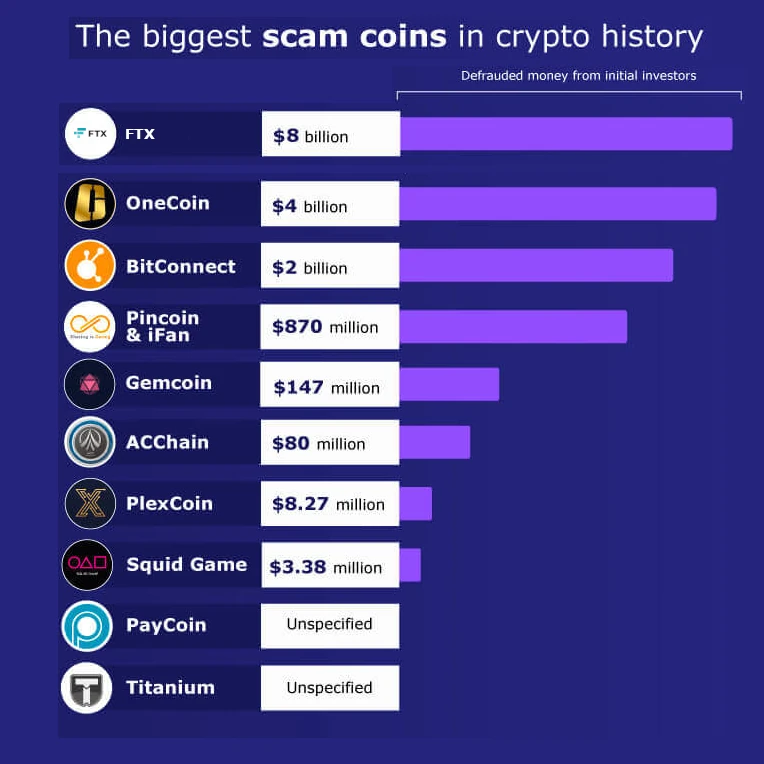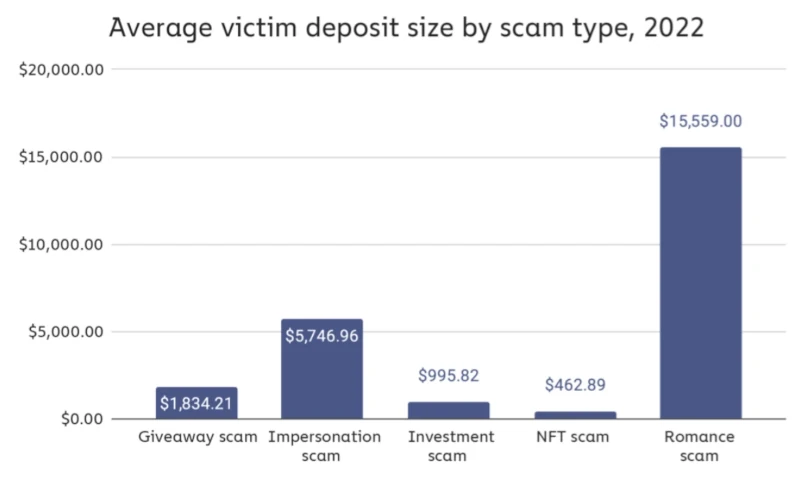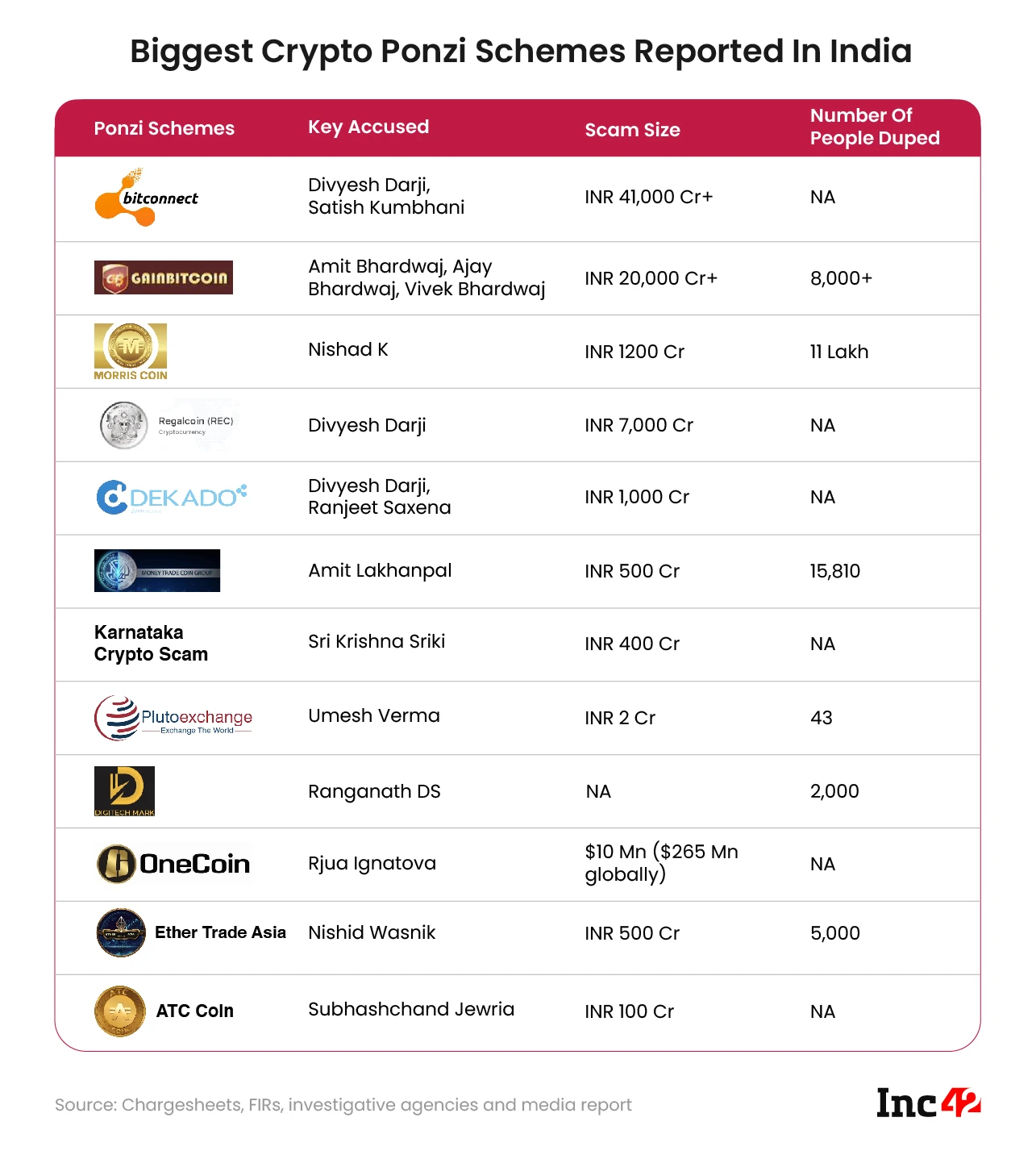Introduction
Cryptocurrency has revolutionized the financial landscape, because offering a decentralized and secure form of digital currency. However, with its rise in popularity, the number of cryptocurrency scams has also increased.
In fact, in this article, I will explore the world of cryptocurrency scams, uncovering some of the most infamous scams in history.
Then, I write about the different types of scams, and learning how to protect yourself from falling victim to these fraudulent schemes.
Most Infamous Cryptocurrency Scams
The world of cryptocurrency has witnessed some of the most audacious and high-profile scams, surely.
The scam that plagues the crypto community is the embezzlement of money from a customer on the FTX exchange. The scam took place in 2022 during a bear market. The total amount of money embezzled is 8 billons.
One such scam was the infamous Mt. Gox incident, where the largest Bitcoin exchange at the time lost over 850,000 Bitcoins due to a hacking attack.
Another notable scam was the Bitconnect Ponzi scheme, in fact. Project promised high returns on investments but eventually collapsed, leaving investors with significant losses. These scams serve as a stark reminder of the risks associated with investing in cryptocurrencies and the need for caution, but there were much more of scam incidents.

Indeed, there are frauds and scams in the cryptocurrency market.
In 2022, FTX is the most significant example of this, but not the only one.
In fact, there is a scam on this market every year. Time after time, sometimes bigger, but sometimes smaller.
Different Types of Cryptocurrency Scams
Cryptocurrency scams come in various forms, each with its own set of strategies to deceive unsuspecting investors.
One common type is phishing scams, where scammers create fake websites or emails that closely resemble legitimate cryptocurrency platforms to trick users into revealing their private keys or login credentials.
Another type is pyramid schemes, where individuals are promised high returns for recruiting new investors, creating a never-ending chain that ultimately collapses.
Additionally, there are fake ICOs (Initial Coin Offerings) and pump-and-dump schemes, where scammers manipulate the market to artificially inflate the value of a cryptocurrency before selling it at a profit.

According to research conducted by Chainalysis, the largest amounts of loss could be observed in the so-called romance scam.
In this case, the average amount of loss was $15,559. In second place was the impersonalization scam.
I should write something about these two scams. Romance scam is a scam in which a person is met on the Internet and, thanks to him, a fraud occurs.
Such a person convinces the victim of his sincere intentions and in this way the victim provides access to the cryptocurrency account or transfers cryptocurrencies to another account.
In the case of impersonalization scam, a person pretends to be a policeman, a stock exchange employee or another person of high authority. The victim provides access to the account or the data itself. The transfer takes place and the scam is successful.
Signs of a Cryptocurrency Scam
Recognizing the signs of a cryptocurrency scam is crucial in protecting yourself from falling victim to fraudulent schemes.
One red flag to watch out for is unrealistic promises of high returns with little to no risk. If an investment opportunity sounds too good to be true, it probably is.
Another warning sign is pressure tactics employed by scammers to rush you into making a decision. Legitimate investments allow you time to research and consider your options.
Additionally, be cautious of unsolicited messages, especially those asking for your personal information or investment funds. Always verify the legitimacy of the sender and double-check any claims made.
Common Cryptocurrency Scams in the US
The United States has seen its fair share of cryptocurrency scams, with unsuspecting investors losing millions of dollars.
The FTX example I mentioned is so far the largest scam in the history of cryptocurrencies.

One notable scam was the OneCoin Ponzi scheme, which operated from 2014 to 2016, defrauding investors of billions of dollars.
Another scam involved the Centra Tech ICO, where the founders falsely claimed partnerships with major financial institutions to attract investors.
It is crucial for investors in the US to be aware of these scams and exercise caution when investing in cryptocurrencies.
Notorious Cryptocurrency Scams in India
India has also witnessed its fair share of cryptocurrency scams, with the most notorious being the BitConnect scam.
This Ponzi scheme promised astronomical returns to investors, leading many to invest their hard-earned money.
However, the scheme eventually collapsed, leaving investors devastated.
Another scam involved GainBitcoin, where the mastermind behind the scheme duped investors into purchasing mining contracts that never materialized.
These scams highlight the need for regulatory measures and investor education to protect individuals from falling prey to fraudulent cryptocurrency schemes.

In case of cryptocurrency scams in India people lost a lot of money. India as a country is a leader in global cryptocurrency adoption.
Unfortunately, the lack of honesty of the owners of stock exchanges and coins goes hand in hand with many innocent investors.
Particularly noteworthy is the character, Darji’s Divyesh.
Because of the 5 largest cryptocurrency scams in India, this figure played a key role in 3 of them.
One is tempted to ask whether people draw conclusions from the mistakes they have made before?
And were these scams connected to more than just the people I mentioned earlier?
Cryptocurrency Scams in Europe
Do you think that the USA and India are the only countries where cryptocurrency scams took place?
Well, no. As an example of Europe, I will describe the previously mentioned OneCoin. More details in a moment.
One of the most infamous cryptocurrency scams in Europe took place in 2017, when a Bulgarian-based company called OneCoin duped thousands of people out of their hard-earned money.
Promising huge returns on investments, OneCoin attracted investors from all walks of life.
However, it soon became apparent that this was nothing more than an elaborate Ponzi scheme.
The mastermind behind this scam, Dr. Ruja Ignatova, vanished into thin air, leaving behind a trail of devastated investors.
This scandal shook the cryptocurrency world to its core and highlighted the need for stricter regulations.
How to Protect Yourself?
Protecting yourself from cryptocurrency scams requires a combination of caution and due diligence.
Firstly, educate yourself about cryptocurrencies and the various scams that exist. Stay updated on the latest news and developments in the cryptocurrency space to spot potential red flags.
Secondly, always conduct thorough research before investing in any cryptocurrency or participating in an ICO. Verify the legitimacy of the project and the individuals behind it.
Thirdly, secure your digital assets by utilizing hardware wallets or cold storage solutions to protect your private keys from hacking attempts.
Lastly, trust your instincts. If something feels off or too good to be true, it is better to err on the side of caution and refrain from investing.
Reporting Cryptocurrency Scams
If you have fallen victim to a cryptocurrency scam or suspect fraudulent activity, it is important to report it to the relevant authorities.
In the United States, you can report scams to the Federal Trade Commission (FTC). There is the Securities and Exchange Commission (SEC), also. One of those two commission should be enough.
In India, the Reserve Bank of India (RBI) and the Ministry of Finance are the appropriate channels for reporting scams.
Additionally, consider seeking legal advice to explore any possible recourse or recovery options. It is important to take action and not let scammers go unpunished.
Staying Updated on Cryptocurrency Scams
To stay informed and updated on the latest cryptocurrency scams, there are several resources available.
Websites such as CoinDesk, Cointelegraph, and CryptoScamAlert provide news and information about scams and fraudulent activities in the cryptocurrency space.
Additionally, following reputable cryptocurrency influencers and experts on social media platforms like X (older Twitter). Because they can provide valuable insights and warnings about potential scams. So, better read or listen that!
By staying vigilant and utilizing these resources, you can stay one step ahead of scammers and protect your investments.
Conclusion
As cryptocurrencies continue to gain popularity, so do the risks associated with fraudulent schemes.
By understanding the different types of scams, then you recognizing the warning signs. Finally, taking necessary precautions, you can protect yourself from falling victim to cryptocurrency scams.
Stay informed, conduct thorough research, and trust your instincts when it comes to investing in cryptocurrencies.

Leave a Reply
You must be logged in to post a comment.